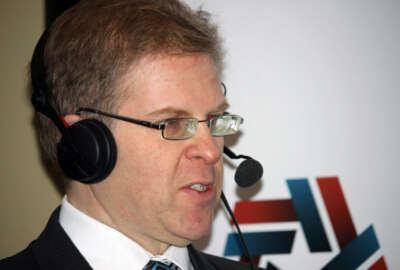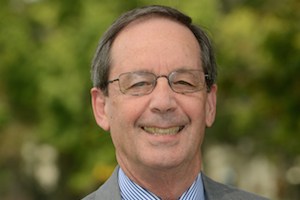
Cara Abercrombie, Presidential Rank Award Winner
Continuing his series of interviews with the most recent class of Presidential Rank Award winners, the Federal Drive with Tom Temin spoke with someone who's be...
Continuing his series of interviews with the most recent class of Presidential Rank Award winners, the Federal Drive with Tom Temin spoke with someone who’s been on his show before. Cara Abercrombie is the former Acting Deputy Director of the Defense Security Cooperation Agency. She’s now on detail at the National Security Council.
Interview transcript:
Tom Temin
Tell us now, what your title is and more important, what you’re doing at the National Security Council these days.Cara Abercrombie
Sure. So I am deputy assistant to the president, and coordinator for Defense Policy and Arms Control with the National Security Council. I’ve been on detail there, since January of 2021. And I lead a couple of teams, on the Defense side of the house, we are looking largely at space policy, nuclear policy, force posture, security cooperation, including with Ukraine over this past year, as well as looking to, ultimately close the detention facility at Guantanamo Bay. On the arms control front, we’re looking for an extension, eventually, hopefully, to then New Start Treaty, arms control, nonproliferation, export controls and a host of other things.Tom Temin
It seems like the pandemic, and then what you were in the midst of when you started there, and now the Ukraine situation has really scrambled things, with all of these weapons flows going to different parts of the world. Principally, to Ukraine from different parts of the world. And it’s not nuclear, but it’s still things that would come under arms control?Cara Abercrombie
Yeah. Certainly, we are working across the interagency, as you’ve seen, have sent a tremendous amount of security assistance to Ukraine. And one of the things my team has been working diligently on, across the interagency, is ensuring we have accountability for the systems, and we do have confidence in that. We’ve worked a lot with countries in the region over the years, to ensure arms are not illicitly transferred across borders, we’ve helped build capacity, and more broadly, looking to uphold broader arms control and nonproliferation regimes, which, as you noted, are being tested at the moment.Tom Temin
And as we send evermore sophisticated weapons to Ukraine, and now these German tanks, looks like they’re going to be headed there. And those are pretty high tech, because Germany has a history of making good tanks. Is one of the worries that these things could fall into Russian hands? Because their stuff turns out to be pretty primitive and sort of crappy, compared to what the West has. And they could get a hold of some of the stuff and get a jumpstart?Cara Abercrombie
With every arms transfer decision that we or our allies make, we factor in all of these considerations about the risk of possibly falling into other hands. And we’re quite confident, number one, that the Ukrainians are using these to great effect and quite responsibly. We’re not really worried about the risk of transfer writ large. But certainly, on the battlefield, there is always that risk. And so we factor that into account before we transfer anything.Tom Temin
And just to roll back to history for a moment. When you were with us the last time, a few years ago, you were working on job certification, job training standards for people working for the Defense Security Cooperation Agency, at that time. How did that all come out? And what kind of standards or job basic training needs did you come up with?Cara Abercrombie
Yeah, I’m really proud of that effort. It was a rather herculean effort that was mandated by Congress, who noted appropriately, that we spent an awful lot of U.S. assistance dollars and time on providing our allies and partners with capabilities and training. And they wanted to ensure that the U.S. workforce was properly trained, not only in the laws and regulations that govern all of that, but also in the implications for our relationships with countries abroad. So what we did, was over a two year period, really, both develop a certification program to train more than 15,000 [Department of Defense (DoD)] civilian and military officials, who do that kind of work across the department and around the world. And we created a three-tiered training system. We invested heavily in the educational platform. We established the Defense Security Cooperation University, I was the first president of that. But we went to great pains, before the pandemic, to make sure we had a very strong learning management system that was capable of delivering web based virtual learning, in addition to in classroom training, which served us very well in the pandemic. It led us pilot the program, virtually in the first year, and I’m very proud to say the program’s now been officially established into Defense Department policy, through an instruction, and is well underway to training and certifying the workforce.Tom Temin
We are speaking with Cara Abercrombie. She’s a recent presidential rank award winner, now on detail at the National Security Council. So would you say that work? In developing the workforce and the tools to keep developing it, would be one of the reasons you feel you got that rank award?Cara Abercrombie
Absolutely. That was, as I said, a rather significant undertaking. And in doing so, I had a very strong team at the Defense Security Cooperation Agency. We’ve worked diligently to be smart about setting up something new. There had been actually, a RAND study commissioned, at the outset when the legislation was passed that estimated more than 250 new positions would need to be created to implement a program of this scale. I am proud to say, because we automated a lot of the compliance mechanisms through connecting the learning management system to personnel databases, we only needed to hire about two dozen new personnel. So that was, investment up front and thinking smartly about how to run a program, reaped tremendous dividends.Tom Temin
I guess they call that efficiency. Well, that’s interesting, because now that you have participated at the policy level, and you’re close to the central nervous system of the whole defense and national security apparatus. And yet, you’ve also operated nuts and bolts, bureaucratic programs to make sure that the government people are trained and the systems they use to train are up to date. So you’ve worked, really, at the operational level. And now at the policy level. What does that make you, do you think? Pretty senior, I think you’re a member of the senior executive service, but not many people get to work at both those levels, do they?Cara Abercrombie
No. I feel very fortunate, it is not common for career officials to be detailed to the level that I’ve been detailed at the White House. I pinch myself every day for having the opportunity to serve at the White House. But I think, it makes me a better assistant to the president to the National Security Adviser, because I know how when we establish new policy, I know what it takes to actually implement it across the bureaucracy. And I think that helps me connect the implementers, if you will, to help them sort of see the vision that we’re trying to accomplish through policy, and help them navigate a path to making it achievable. But also, to set realistic expectations. At the White House, we can have bold vision, but we also need to be pragmatic and what it will take to get that accomplished.Tom Temin
And day to day, what’s your life like? Are you going to an office somewhere? I imagined the National Security Council is somewhere in the vicinity of the White House.Cara Abercrombie
That’s right, we’re in that very large, beautiful ornate building. The Eisenhower Executive Office Building, right next door to the West Wing. My daily commute is walking back and forth across that street multiple times a day for meetings and engagements. And we’ve been in the office, since day one, despite the pandemic just because of the nature of the work.Tom Temin
Right. That big old pile that was war, treasury and state, I think at one time. So the second empire building that we all admire so much with the great stairwells. So it’s mostly meetings all day?Cara Abercrombie
Mostly meetings all day, yes.Tom Temin
Wow, and do they provide coffee for the meetings, or everyone brings their own in the government?Cara Abercrombie
The little secret at the White House is, the White House supplies us with chocolate and soda. So plenty of caffeine and sugar to go around.Tom Temin
Well that makes it bearable. So what are your plans? Where do you go from here? Someone that has done what you’ve done?Cara Abercrombie
I am committed to public service, I feel passionately about the importance of having career officials who can provide that institutional continuity across administration. So I’m very proud to serve in the Biden administration. But I’m also, very proud to continue serving in the federal government, in some capacity, when this little tour is over.Tom Temin
So you’ll go back to regular Title 5 career person when this one is over?Cara Abercrombie
Yes.Tom Temin
OK. And are there things that you can’t discuss with the family and so forth? There must be clearance level discussions at the National Security Council.Cara Abercrombie
That is not dissimilar from a lot of the work I’ve done at the Defense Department. My husband just knows, if the phone rings, I need to take it and maybe he’ll read about it in the paper tomorrow.
Copyright © 2024 Federal News Network. All rights reserved. This website is not intended for users located within the European Economic Area.
Tom Temin is host of the Federal Drive and has been providing insight on federal technology and management issues for more than 30 years.
Follow @tteminWFED






